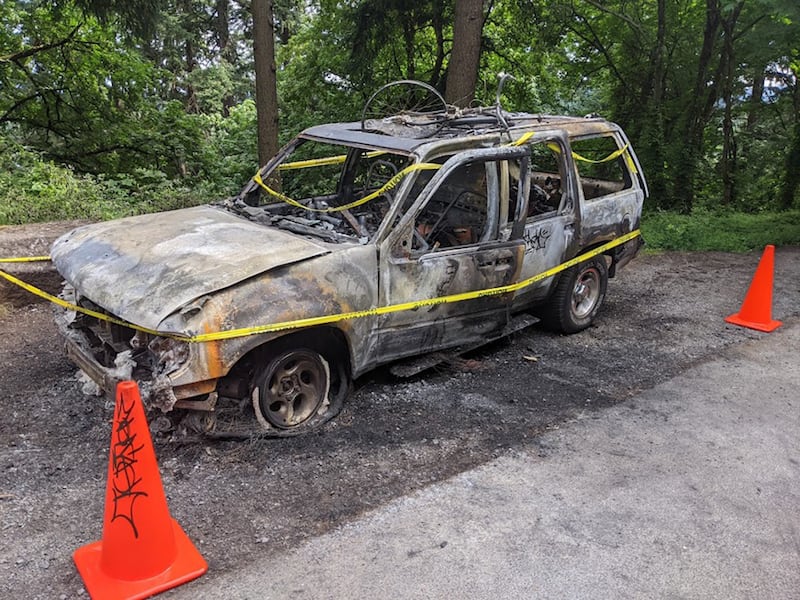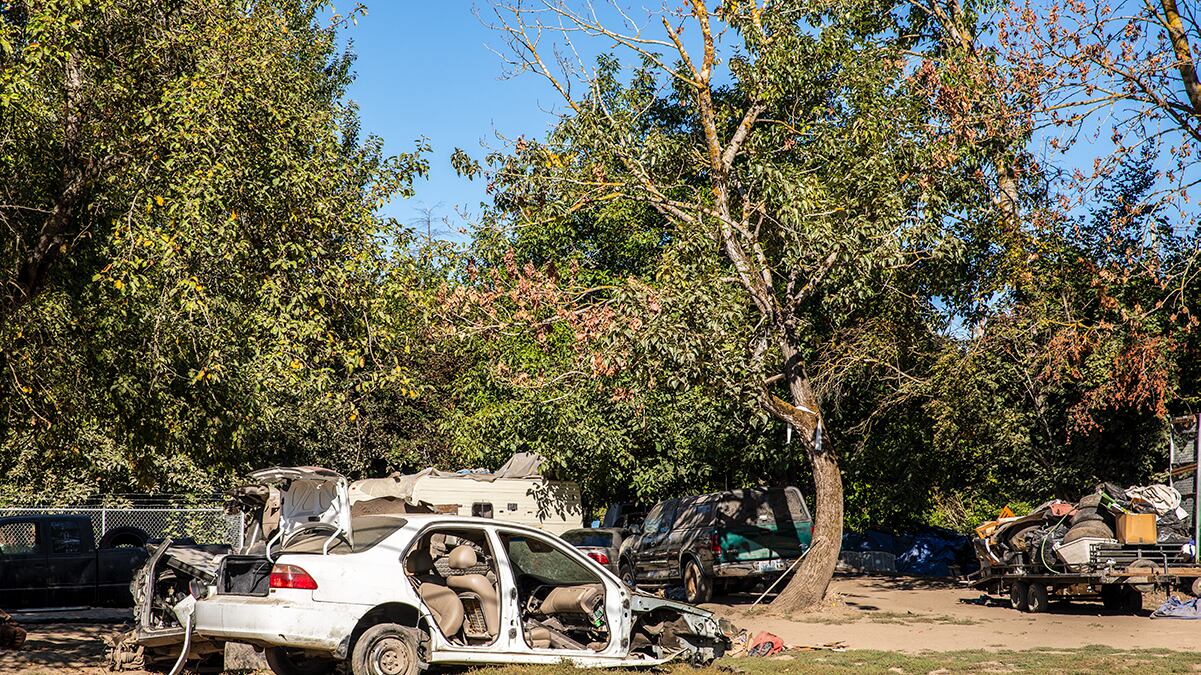Every day, 20 cars on average get stolen somewhere in Portland. Jennifer Wilkins knows where to find many of them.
Just like clockwork, Wilkins says, an unmarked tow truck shows up two to three times a week near her business in outer Northeast Portland, dropping off another mystery vehicle at a homeless camp partially shrouded by clusters of tall trees.
“It’s basically one big chop shop,” says Wilkins, who runs Acme Storage on Northeast Simpson Street in the Sumner neighborhood. “You can see tow trucks bringing cars in and dropping them off. They just sit there on the street and chop them up,” adds Wilkins, who estimates she’s called police dozens of times about stolen cars in the past year. “The police don’t do anything.”
Cars in various stages of dismemberment along city streets is a common sight these days. The husks are leftovers from Portland’s outbreak of auto thefts—and a signal of the indifferent response of law enforcement to brazen criminality.
Hot spots around the city—sometimes associated with homeless camps—often have half a dozen cars in various stages of disrepair and dismemberment in the open air.
Chop shops aren’t a new phenomenon. They’ve long operated in unlicensed sheds on the city’s fringes. Car parts, including engines, tires and, particularly, catalytic converters, are valuable—and the numbers show that. But what’s happening now is new: People are brazenly stripping stolen cars for parts outdoors, in full view of passersby, and nobody does anything to stop it.
Kevin Flanigan owns Schooner Creek Boat Works on Hayden Island in North Portland. “Last year, in the springtime, we had one RV show up, and then another one, and within a few weeks the entire street was lined with RVs, and they were pulling cars down onto the road and stripping them right in the middle of the street,” Flanigan recalls. “On the first day, there’s no tires on the car. And then the next day, there’s no hood. It’s just a chop shop in the open.”
That chop shop, by the train tracks at the end of Hayden Island, was cleared just last week after over a year in operation, Flanigan says. But he’s noticed that the problem seems to have simply migrated to Delta Park and along the nearby Interstate 5 on-ramp.
The Portland Police Bureau says actively tracking stolen cars is not a priority: “That wouldn’t be very productive,” says spokesman Sgt. Kevin Allen.
Allen blames the lack of response on low police staffing.
“Anytime we’re debating whether to pursue a life safety case versus a property crime, we’re always going to lean towards life safety,” Allen says. “We’re in a place now where there’s no fat to trim, so anytime you’re taking resources to do something, you’re taking them away from something else.”
The results are predictable: For the year ending June 30, thieves stole 7,905 cars in Portland. According to figures the Portland Police Bureau released recently, that’s 62% above the annual average for the 10 years before the pandemic.

Allen says most stolen cars are eventually recovered and returned to their owners: 70% are returned to owners within 30 days, and 90% are recovered overall.
That’s a solid clearance rate. But the cars are rarely returned intact.
Take the case of Ellen, who asked to be identified by her first name only for privacy reasons. Three weeks ago, her red and silver 2005 Ford Escape Hybrid went missing from outside her St. Johns apartment.
After Ellen, 28, filed a police report, the car’s vehicle identification and license plate numbers went into a database for stolen vehicles. Officers don’t actively hunt for stolen cars, but if they see one they suspect is stolen, they’ll scan the vehicle’s VIN to see if it’s in the system. If it is, they contact the owner.
Ellen got a call from police a week after she reported her vehicle stolen. They had found it in Wood Village and ordered it towed to an impound lot in Troutdale.
“When I got to the tow yard, they were like, ‘Oh, it’s going to look different,”’ Ellen remembers.
It did.
“It had been spray-painted all black,” Ellen says. “The rims were purple. It was filled with trash and stolen goods, including three bicycles, a suitcase full of women’s purses, a shoeshine kit, and a brand-new Eastman ax.”
Also in the vehicle: a Taser, a few knives, a Bluetooth speaker, and a cream pie and head of broccoli on the dashboard.
The towing company told her: It’s all yours, even the stolen goods. An appraiser gave her tougher news—her vehicle was a total loss.
For several days, Ellen’s car became one of the rash of vehicles littering the sides of Portland-area roads. Not all of them are stolen: Abandoned cars, too, are a mounting eyesore during the pandemic.
Some vehicles are simply abandoned by their owners or stolen without a police report ever being filed. The Portland Bureau of Transportation is then responsible for them. PBOT has strict criteria for what constitutes an abandoned vehicle: It’s been left sitting for at least 24 hours, and is either inoperable, has insufficient registration or has been junked.
At the beginning of the pandemic, PBOT implemented a rule prohibiting towing vehicles in which people sleep. That policy remains in place.
“If someone lives in it, we’re not going to move it unless it’s creating an immediate safety hazard, like blocking a travel lane or construction,” says PBOT spokesman Dylan Rivera.
But if a vehicle is abandoned and nobody is living in it, PBOT tags the vehicle and, after 72 hours, orders it towed to an impound lot by a city-contracted tow company. (Rivera acknowledges it often takes days and sometimes weeks longer than that to get around to towing a tagged car.)
“It’s fair to say that during the pandemic, abandoned autos have continued to grow as an issue,” Rivera says, largely because the Oregon Legislature passed a temporary law in 2020 prohibiting penalties for expired registration tags, including towing. “[That] meant we couldn’t use it as a criterion for abandoned autos.”
That law is no longer in effect, allowing PBOT to now impound cars with tags expired for more than six months.
But after towing fewer vehicles than it did earlier in the pandemic, PBOT is now ramping up its efforts. In 2020, bureau towed 1,858 abandoned vehicles. Since the beginning of 2021, it has towed 2,886.
Scrap metal yards say they pay about $150 to $250 for the frame of a car.
With about 145 sworn officer positions vacated since last summer, the Portland Police Bureau says it’s overwhelmed responding to shootings and other violent crimes. The Oregonian reported last week that wait times for Portlanders calling 911 now average far longer than they do nationally. Nonetheless, the bureau has had success recovering stolen cars, recently publicizing its vehicle recovery missions on social media.
On Sept. 10, North Precinct officers announced the recovery of 15 stolen cars along Northeast Marine Drive and Airport Way—a graveyard for stolen vehicles.
“Some were drivable and some were nearly unrecognizable,” PPB wrote on Twitter.
That’s a start. But Flanigan, the boat shop owner, and others want police to go after car thieves and chop shops more aggressively.
“One time, there was a guy sitting in the middle of the street stripping a car,” Flanigan recalls. “We called the police and they said they couldn’t do anything.”

